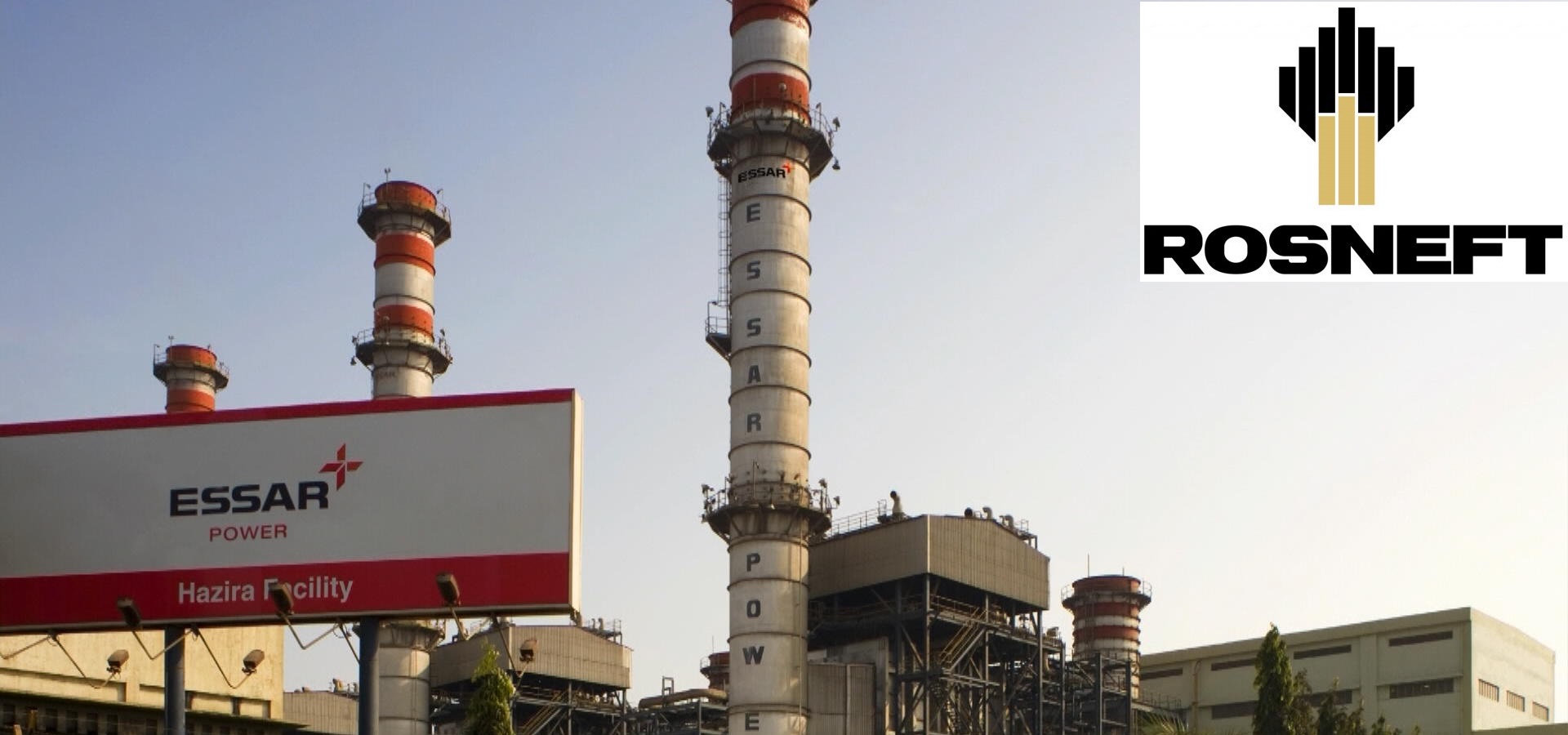Essar Oil runs the Vadinar refinery in Gujarat, which can process about 400,000 barrels a day. Most of the refinery’s output is sold locally, either through its own outlets or to government-owned fuel retailers. In July last year, Rosneft signed an agreement to supply Essar about 200,000 barrels of crude per day over 10 years.
TRANSACTION:
The Ruias of the Essar group signed a binding agreement to sell 98 per cent stake in Essar Oil Limited (EOL) at an enterprise valuation of Rs. 72,800 crores and an additional Rs 13,300 crore will be paid for the acquisition of Vadinar Port including debt, to a group led by Russian oil major, Rosneft, and comprising Singapore-based commodity trader, Trafigura, and Russian fund, United Capital Partners. The 49 per cent of Essar Oil’s stake will be picked up by Rosneft, while the remaining 49 per cent stake will be sold to consortium Trafigura and UCP equally. In this consortium, Essar will hold 2 per cent of stake as they were asked to continue with a small stake and there are no special rights attached. The remaining 2 per cent of the company is held by minority shareholders.
Please Note: The closing of the deal is conditional upon receiving requisite regulatory approvals and other customary conditions. The companies expect to obtain the relevant approvals before the end of this year.
Phase I: Discussion with Russian Oil Giant Rosneft for 49% stake Sell in Essar Oil Limited
Phase II: Start process for delisting
Phase III: Stake sale in refinery
Phase III: Demerger of Vadinar terminal from Essar ports and sale to Rosneft-led consortium
Essar Energy Holdings and Oil Bidco (Mauritius) which control Essar Oil have signed separate agreements for the 98% stake sale. The remaining 2 per cent is held by minority shareholders after delisting of Essar Oil.
DELISTING:
- The delisting process was approved by the board and fixed the floor price at Rs.108.18 per share. However, market regulator Securities and Exchange Board of India (Sebi) sort clarifications following shareholder complaints.
- SEBI ask the company to match the per-share delisting price to the price at which Rosneft bought 49% stake in Essar Oil. As a result, the floor price was revised to Rs.146.05 per share.
- Later on the company offered Rs.262.80 per share to its public shareholders, an 80% premium to the floor price of Rs.146.05 per share. The offer price pegs the valuation of the company at Rs. 38,000 crores, or $5.75 billion.
- The 142.5 million shares held by public shareholders, the promoters have acquired 101 million shares through the open offer.
The deal value is higher than the delisting price of Rs 262.8 a share at a valuation of around $6.25 billion. Minority shareholders will get the differential amount. The company paid out Rs. 3,745 crores to complete the delisting process. The Rs. 3,745 crores that will be paid to shareholders makes this the largest payout to privatize a publicly listed company in India.
WHAT IS FOR ROSNEFT?
Rosneft is majority owned by the Russian government with BP Plc holding under a 20 per cent stake and public shareholding at around 10 per cent.
- Entry into one of the most promising and fast-growing world markets for petroleum products
- Acquisition of the company which operates one of the world’s most complex refineries and runs India’s largest private sector retail network
- Access to already established 2,700 retail outlets currently owned and operated by Essar Oil.
It provides unique opportunities for synergies with the existing assets of the company and is consistent with Rosneft’s enhanced presence in fast-growing markets of other countries, such as Indonesia, Vietnam and the Philippines. It can turn India into a mini-hub and it will bring down company logistics cost in Asia.
ESSAR GROUP
The Group strategy has been to construct world class assets/company and then sell it at the right time. And this has been proven strategy for the group as earlier, the Ruias had sold their stake in the wireless telephony company to Vodafone Plc. And till date, they have done deals that led to an FDI infusion of more than $30 billion into India.
Ruias went with a $20 billion investment programme about six years ago, in which we built capacity and invested in all the sectors where they were present: like steel, oil and gas, power and ports, etc. So the group built huge long term debt which currently stands approx. 90,000 crores. It has built world class assets with the initial phase of building the refinery, then one period when it went into a problem because of the delay in setting up the refinery. Then the commissioning of a 10 million tonne refinery and doubling it and later (building the) 2,700-outlet retail network. It’s thus been a long journey and what’s more important is that the company performed very well in the last few years. It is a world scale asset and they are probably the largest in the private sector for the retail sector. Essar oil India is about 25-30% of ESSAR portfolio.
- The value of the company has also been strengthened by the integrated nature of its business and the strategic positioning of its assets. Its 20 million tonne (MT) oil refinery in Vadinar, which accounts for nine per cent of India’s total refining output, is supported by a 1,010 Mw captive power plant.
- The additional Rs. 13,300 crore that the new stakeholders have agreed to pay is for the 58-mt deep draft port in Vadinar that helps in importing crude and exporting finished products.
The transaction with Russian firm demonstrates their unique ability to build world-class assets and create immense value in businesses. For the current transaction they might be getting the right valuation but the promoters will not get any non-compete fee.
Once completed, the transaction will help Essar deleverage its balance sheet by half in one shot at two levels at the operating and also promoter holding company to retire debt. And also the monetisation through this sale by Essar Oil will help drive the next level of growth for businesses.
The Funds will be utilised for its other operating companies of the group that is approx. $5 billion. As far as the holding company goes, it will be substantially deleveraged.
WHAT IS LEFT WITH ESSAR GROUP?
Post the transaction the core strength, of course, will be oil and gas refinery in UK, steel, ports and power. They will continue to focus on the oil & gas business as well, as Essar is not exiting the oil and gas business it will continue to own and operate the 12 million tons refinery at Stanlow in UK which has a 12-13 percent market share in Britain. Also, the exploration and production assets of Essar Oil portfolio compromising of five CBM blocks, mainly the producing coal-bed methane holding up to 10 trillion cubic feet of gas resource in West Bengal will not be part of the deal and would continue with the Group. Essar said the companies have signed an agreement according to which the new promoters would continue with the “Essar Oil” brand name.
Investment by Trafigura and United Capital Partners?
Trafigura Group is one of the world’s leading independent commodity trading and logistics group with revenues of about $100 billion (around Rs 6.67 lakh crore). United Capital Partners (UCP) is a large independent Russian private investment group with investments of around $3.5 billion (Rs around 23,349 crore) in various industrial sectors. They might be looking at this as a very strategic long term investment.
CONCLUSION:
The Ruias strategy has been to build world assets which create value for business and sale the business at the right time. This has been the second deal in five years that gets them many billions of dollars. In 2007, they sold their stake to Vodafone. The deal is win-win for lenders and the Ruias and in fact enable Ruias to focus on remaining business without bothering about huge debt repayment and interest cost.




